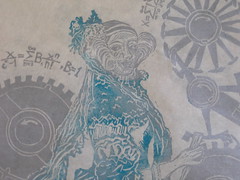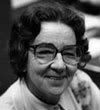 Today is the second annual international day of blogging to celebrate the achievements of women in technology and science, Ada Lovelace Day 2010 (ALD10). I'm sure you'll all recall, Ada, brilliant proto-software engineer, daughter of absentee father, the mad, bad, and dangerous to know, Lord Byron, she was able to describe and conceptualize software for Charles Babbage's computing engine, before the concepts of software, hardware, or even Babbage's own machine existed! She foresaw that computers would be useful for more than mere number-crunching. For this she is rightly recognized as visionary - at least by those of us who know who she was. She figured out how to compute Bernouilli numbers with a Babbage analytical engine. Tragically, she died at only 36. Today, in Ada's name, people around the world are blogging about women in science and technology, whose accomplishments have all too often gone unrecognized or unacknowledged.
Today is the second annual international day of blogging to celebrate the achievements of women in technology and science, Ada Lovelace Day 2010 (ALD10). I'm sure you'll all recall, Ada, brilliant proto-software engineer, daughter of absentee father, the mad, bad, and dangerous to know, Lord Byron, she was able to describe and conceptualize software for Charles Babbage's computing engine, before the concepts of software, hardware, or even Babbage's own machine existed! She foresaw that computers would be useful for more than mere number-crunching. For this she is rightly recognized as visionary - at least by those of us who know who she was. She figured out how to compute Bernouilli numbers with a Babbage analytical engine. Tragically, she died at only 36. Today, in Ada's name, people around the world are blogging about women in science and technology, whose accomplishments have all too often gone unrecognized or unacknowledged. So I thought I'd tell you about of one my heroes, Ursula Franklin. I've heard her speak on more than one occasion and had the honour meeting Franklin. When I was an undergraduate in physics there were a grand total of zero female physics professors at this University, but Ursula Franklin was trained as a physicist and was working in metallurgy and material science, and had U of T's highest rank, a full University Professor, the first woman named to that post. Further she was not only a strong, fearless, advocate for women in science, but one of the more impressive individuals I've ever met. Her influence as a roll model of women in physics and engineering here cannot be overstated. I thought she was an apt choice to profile as beyond the importance and depth of her own scientific and technological output, she has been an influential writer on the politics and social impact of technology itself.
So I thought I'd tell you about of one my heroes, Ursula Franklin. I've heard her speak on more than one occasion and had the honour meeting Franklin. When I was an undergraduate in physics there were a grand total of zero female physics professors at this University, but Ursula Franklin was trained as a physicist and was working in metallurgy and material science, and had U of T's highest rank, a full University Professor, the first woman named to that post. Further she was not only a strong, fearless, advocate for women in science, but one of the more impressive individuals I've ever met. Her influence as a roll model of women in physics and engineering here cannot be overstated. I thought she was an apt choice to profile as beyond the importance and depth of her own scientific and technological output, she has been an influential writer on the politics and social impact of technology itself. Franklin was born in Munich in 1921 and survived being interned by the Nazis. She received her PhD in physics from the Technical University of Berlin in 1948 and immigrated to Canada, where after a post-doc at U of T, she joined the faculty. She pioneered archeometry - the use of modern materials analysis in archeology, dating prehistoric artifacts made of metals and ceramics. Her science was always engaged with societal concerns. During the 60s she advocated for the atmospheric nuclear test ban treaty, citing her studies of strontium-90 radioactive fallout found in children's teeth. During the 70s she was part of the Science Council of Canada investigation of how we could better conserve resources and protect nature. She began to develop her ideas about complexities of modern technological society.
She consistently has stood up for her beliefs in peace and social justice. As a member of the Voice of Women (now called Canadian Voice of Women for Peace), she tried to persuade Parliament to disengage Canada from supplying any weapons to the US during the Vietnam war, to shift funding from weapons research to preventative medicin, to withdraw from NATO and disarm. She later fought to allow conscientious objectors to redirect part of their income taxes from military uses to peaceful purposes (though the Supreme Court declined to hear the associated case). She joined other retired female faculty in a class action law suit against the University of Toronto for claiming it had been unjustly enriched by paying women faculty less than comparably qualified men. The University settled in 2002 and acknowledged that there had been gender barriers and pay discrimination.
As an applied scientist, her writtings on technology benefit from the insight of an insider, but her priorities are justice and peace and she critiques and analyses technology in this light. She does not view technology as neutral; it is a comprehensive system that includes methods, procedures, organization, "and most of all, a mindset". It can be work-related or control-related, holistic and prescriptive. Franklin argues that the dominance of prescriptive technologies in modern society discourages critical thinking and promotes "a culture of compliance". She has investigated the relationship between technology and power. She has investigated how we interact with communication technologies and advocated for the right to silence.
Many of her articles and speeches on pacifism, feminism, technology and teaching are collected in The Ursula Franklin Reader (2006). Franklin is one of many respected scholars and thinkers to have delivered a series of Massey Lectures, in 1989. Hers were gathered and published as The Real World of Technology. She has been recognized for her work in many ways, including receiving the Order of Canada, Governor General's Award in Commemoration of the Persons Case for promoting the equality of girls and women in Canada and the Pearson Medal of Peace for her work in advancing human rights. Locals may know the Ursula Franklin Academy, a Toronto high school, named in her honour. I think this University, city, country and in fact, society at large are a better place because Ursula Franklin is a part of it. So, though she has received this recognition, I think she should be a household name, so that's why she's my choice for Ada Lovelace Day 2010.
{this post includes material from the surprisingly well-documented wikipedia entry on Ursula Franklin}
Read more Ada Lovelace Day posts on The Mad Scientists of Etsy Blog or at Ada Lovelace Day.

No comments:
Post a Comment